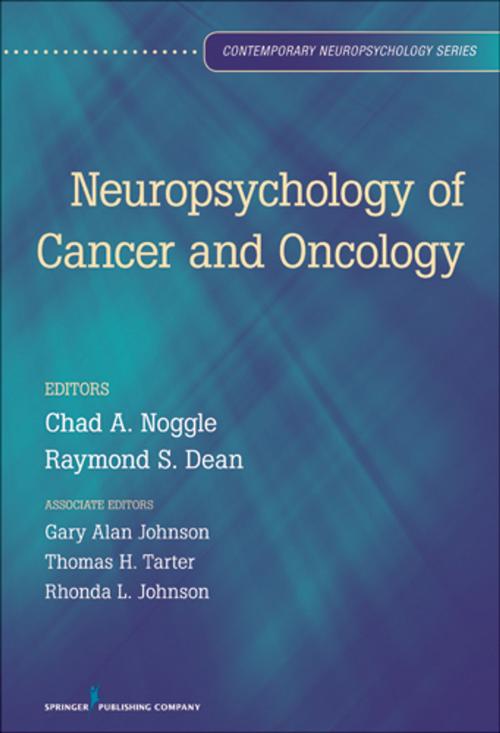Neuropsychology of Cancer and Oncology
Nonfiction, Health & Well Being, Medical, Specialties, Oncology, Psychology, Neuropsychology| Author: | Dr. Dale Johnson, PhD, Thomas Tarter, MD, Gary Johnson, MD, Rhonda Johnson, PhD | ISBN: | 9780826106940 |
| Publisher: | Springer Publishing Company | Publication: | December 17, 2012 |
| Imprint: | Springer Publishing Company | Language: | English |
| Author: | Dr. Dale Johnson, PhD, Thomas Tarter, MD, Gary Johnson, MD, Rhonda Johnson, PhD |
| ISBN: | 9780826106940 |
| Publisher: | Springer Publishing Company |
| Publication: | December 17, 2012 |
| Imprint: | Springer Publishing Company |
| Language: | English |
"This book, in both its direct and indirect inferences, points to the need for disease-specific neurocognitive methods in broadly occurring CNS and non-CNS cancers... All in all, this is a beautifully conceptualized book that should be on the bookshelves of many specialists who work in the very challenging field of Oncology."--Carol L. Armstrong, PhD, Children's Hospital of Pennsylvania, Archives of Clinical Neuropsychology
Interest in the neurocognitive and sensory impairments resulting from many cancers and their interventions has grown considerably over the past decades as an important aspect of quality of life issues for cancer patients and survivors. The Neuropsychology of Cancer and Oncology features current findings on the neuropsychological effects of these cancers and their treatments along with the most promising neuropsychological and behavioral health interventions available to mitigate these deficits. This edited volume, part of the Contemporary Neuropsychology series, bridges the gap between the knowledge of neuropsychologists, who are grounded in the biological and physiological bases of cognition and behavior but not in pathology, and that of oncologists, who often lack expertise in the neuropsychological aspects of cancer.
This text first addresses the biological components and medical care of these cancers, and issues relating to bioimaging. It then discusses the neurological impact of these cancers as they affect different functions, such as memory, learning, and sensory-motor ability, as well as discusses the effects of childhood cancers on neurological development. State-of-the-art neuropsychological and behavioral health interventions are considered, including neuropsychological/cognitive rehabilitation and habituation, pharmacological interventions, and collaborative medical practices. This text is a unique and timely resource for clinical neuropsychologists, clinical psychologists, neurologists, oncologists, oncology nurses, and neurorehabilitation professionals.
Key Features:
- Bridges the gap of knowledge between neuropsychologists and oncologists
- Explores the most current research on the neuropsychological effects of various cancers and their treatments
- Provides state-of-the-art information on promising neuropsychological and behavioralñhealth interventions for impairments created by cancers and their treatments
- Represents a collaboration between some of the foremost scholars and practitioners in neuropsychology and oncology
"This book, in both its direct and indirect inferences, points to the need for disease-specific neurocognitive methods in broadly occurring CNS and non-CNS cancers... All in all, this is a beautifully conceptualized book that should be on the bookshelves of many specialists who work in the very challenging field of Oncology."--Carol L. Armstrong, PhD, Children's Hospital of Pennsylvania, Archives of Clinical Neuropsychology
Interest in the neurocognitive and sensory impairments resulting from many cancers and their interventions has grown considerably over the past decades as an important aspect of quality of life issues for cancer patients and survivors. The Neuropsychology of Cancer and Oncology features current findings on the neuropsychological effects of these cancers and their treatments along with the most promising neuropsychological and behavioral health interventions available to mitigate these deficits. This edited volume, part of the Contemporary Neuropsychology series, bridges the gap between the knowledge of neuropsychologists, who are grounded in the biological and physiological bases of cognition and behavior but not in pathology, and that of oncologists, who often lack expertise in the neuropsychological aspects of cancer.
This text first addresses the biological components and medical care of these cancers, and issues relating to bioimaging. It then discusses the neurological impact of these cancers as they affect different functions, such as memory, learning, and sensory-motor ability, as well as discusses the effects of childhood cancers on neurological development. State-of-the-art neuropsychological and behavioral health interventions are considered, including neuropsychological/cognitive rehabilitation and habituation, pharmacological interventions, and collaborative medical practices. This text is a unique and timely resource for clinical neuropsychologists, clinical psychologists, neurologists, oncologists, oncology nurses, and neurorehabilitation professionals.
Key Features:
- Bridges the gap of knowledge between neuropsychologists and oncologists
- Explores the most current research on the neuropsychological effects of various cancers and their treatments
- Provides state-of-the-art information on promising neuropsychological and behavioralñhealth interventions for impairments created by cancers and their treatments
- Represents a collaboration between some of the foremost scholars and practitioners in neuropsychology and oncology















